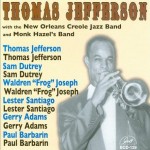This is a joint review along with Johnny Wiggs’ “Congo Square” and Other Vintage Material.
If these musicians had wanted to gather for a drink or some conversation back in the late 1940s to early ’60s when these superb recordings were made, Joe Mares’ Southland Recording Studio is one of the few places in town where they could have done so. Jim Crow was the law of the land in Louisiana, and the integrated bands playing here would not even have been able to meet in each other’s homes, much less play together in public, without risking prosecution, fines and quite possibly jail. Mares, the brother of cornetist Paul Mares, was a clarinetist as well as a businessman and one of the most prolific recorders of jazz musicians both black and white during these classic revival days.
George Buck of Jazzology Records bought up Mares’ entire Southland archive in 1964. Its contents filled three 12-foot by 12-foot bookcases, according to producer Barry Martyn, who has been engaged for the past year and a half in the daunting task of resurrecting what he can from this colossus. The Johnny Wiggs and Thomas Jefferson discs are the latest result.
Cornetist and teacher Johnny Wiggs listed King Oliver and Bix Beiderbecke as his two principal influences. Pete Fountain was one of Wiggs’ students, and talks fondly of him as one of the first people to “hear jazz in me.” The integrated group Wiggs put together here includes both trombonist Emile Christian, who played and recorded with the Original Dixieland Jazz Band, and drummer Paul Barbarin, who recorded with Jelly Roll Morton and King Oliver. Barbarin was also the author of the classic “Bourbon Street Parade.”
Also on hand for the session is the wonderful clarinetist Raymond Burke, whose solo on “Just a Little While to Stay Here” is one of the highlights of this CD. There are also a number of excellent Wiggs originals on this disk, including “Congo Square,” “Two Wing Temple in the Sky,” “Ultra Canal” and Bourbon Street Bounce,” fine material for some of today’s younger trad bands looking for less familiar tunes to play.
Trumpeter Thomas Jefferson was a virtual fixture in trad bands playing Bourbon Street in the ’50s and ’60s, when most black horn men his age were totally involved in bebop or R&B. Though born in Chicago, Jefferson came to New Orleans as an infant. He learned to play at the same Colored Waifs Home where Louis Armstrong had been taught, allegedly on the same cornet. Although Jefferson was rarely a featured performer, he has two bands backing him here, one white, the other black. The tunes he sings and plays include several that only a staunch Armstrong admirer would have chosen, “Of All the Wrongs,” “Back O’ Town Blues” and the Louis original “Someday You’ll be Sorry” among them. The style, though, is very much Jefferson’s own with a soulful lyricism that makes this disc a real find.
Barry Martyn says these are discs number 26 and 27 in his output from the Southland archive, with about another dozen still to go. If the rest are up to the quality of these two, it will be well worth the effort.





